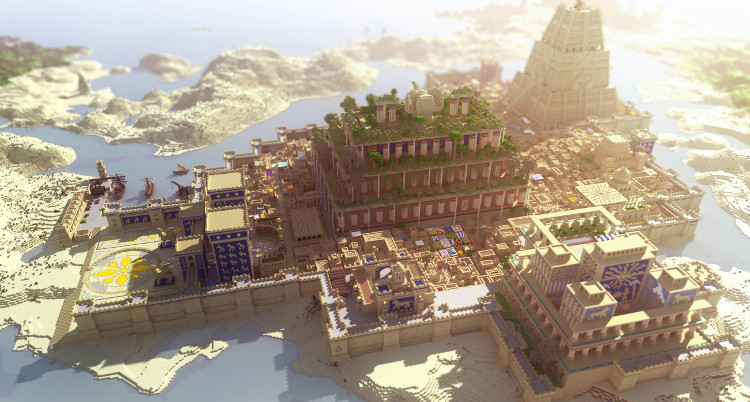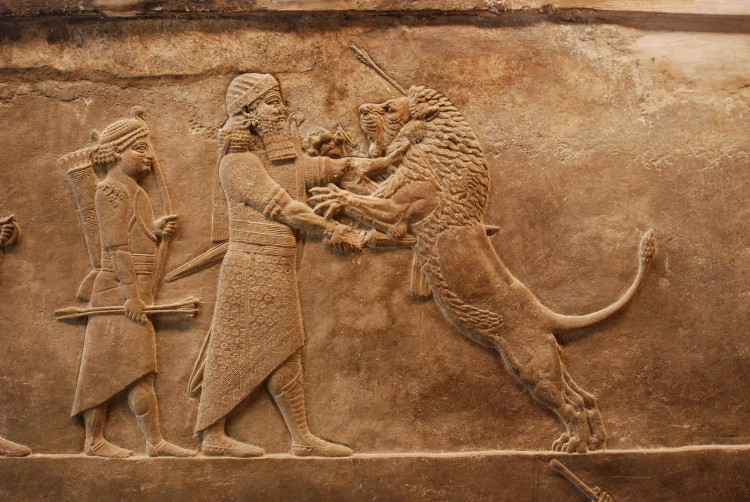Learn 4 Iraq's mighty empire
Iraq is often called a "cradle of civilization" , and today Mesopotamia - Iraq - is one of the first places on Earth people began to live together. Iraq is also home to many mighty empires, with the following 4 typical examples.

The independent state Babylon was founded by the Amorites leader, Sumuabum, in 1894 BC. The first dynasty of the Amorites built the city of Babylon, which later became the ancient empire of Babylon, one of the oldest empires in the history of the world.
Babylon is a prominent example of the ability of people to achieve great goals, by using all the means they have. In addition to agricultural development, the scientific achievements of an ancient civilization were also flourished and contributed to the development of humanity today.
Babylonians know how to operate and describe 40 types of diseases. The medical protector Nilghidzida, whose symbol is solid wrapped around a stick, is used as a medical symbol today. In mathematics, they know the calculations of squares, open bases, pi numbers, and the triangle triangle theorem. Mesopotamian people use the basic counting system 60.

Assyria was a Akkadian kingdom, beginning to exist as a state from the late 25th century or early 24th century BC (BC) to 608 BC with the center in the upper Tigris river, on the northern Mesopotamia (today is northern Iraq).
In the 20th century BC, Assyria formed colonies in Asia Minor and under King Ilushuma, this empire affirmed its dominance over the entire southern region of Mesopotamia. From the end of the 19th century BC, Assyria was involved in the war with the newly formed Babylon state that eventually overshadowed Sumer-Akkad nations in the south.
After it collapsed (between 612 BC and 605 BC), Assyria existed as a province and a geopolitical unit under the rule of the Babylonians, Medes, Achaemenid, Seleucid, Parthia, Roman and empire Sassanid until the invasion and conquest of Mesopotamia of Arab Muslims in the middle of the 7th century AD (SCN), when it was finally dissolved.

The Akkad Empire was the first ancient Semitic-speaking empire of Mesopotamia, with the center in Akkad city in the ancient Mesopotamia region and the land around it also called the Akkad in the Bible.
The Akkad Empire reached its peak period from the 24th century to the 22nd century BC, after the conquests of the king of this kingdom. Under Sargon's reign and his successors, the conquered nations conquered as Elam and Guti had to use Akkad for a short time. Occasionally, Akkad is considered the first empire in history, although the meaning of the term is not accurate, and there are many who think it should belong to the Sumerians before.
After the Akkad Empire collapsed, the people of Mesopotamia were finally reunited into two Akkadian-speaking powers: Assyria in the North, and a few centuries later Babylonia in the South.

The Sumerians were known to be the first to settle in southern Mesopotamia (today Iraq) more than 7,000 years ago. In the 4th millennium BC, this civilization established a system of advanced writing, architecture, art, astronomy and mathematics. The Akkads followed the Sumerians, borrowing culture from them, creating a new language of their own and the first empire in the world.
The origin of the Sumerians remains a mystery to this day. They call themselves Saggiga ('bald people' or 'black-headed people' ) and their country is Kengi ('civilized land' ). Some people believe that they come from all over Anatolia (Turkey today). Others claim that they may come from India and be white in the land. At least around 3500 BC, they settled in southern Babylon, Iraq today.
- Snake King's mystery, supreme warrior and dream of mighty Mayan empire
- Shocking revelations about the mighty warrior of Genghis Khan
- Dust can also cause a mighty empire to collapse
- The mighty empire smashed the capital of the enemy through a 6-pound gun
- Athanatoi - Does the mighty cavalry name 'immortal' be worthy of that name?
- The most powerful Empire ever defeated the Roman Empire and ended after 'bullying' Russia
- Discover the most powerful empire ruins of ancient times
- Fraternity is similar to the collapse of the Inca empire
- Discovered the unexpected cause of the collapse of the ancient Roman empire
- Horrifying revelations about the Eastern Roman Empire
- Decode extreme military tactics of the Ottoman Empire
- Behind the fall of the Maya empire
 'Fine laughs' - Scary and painful torture in ancient times
'Fine laughs' - Scary and painful torture in ancient times The sequence of numbers 142857 of the Egyptian pyramids is known as the strangest number in the world - Why?
The sequence of numbers 142857 of the Egyptian pyramids is known as the strangest number in the world - Why? History of the iron
History of the iron What is alum?
What is alum? Top 6 little-known historical events that make even historians surprised
Top 6 little-known historical events that make even historians surprised  Ancient civilizations in Africa that you may not have known!
Ancient civilizations in Africa that you may not have known!  The cause of shock that caused the Maya empire to evaporate: Warning about the apocalypse is real
The cause of shock that caused the Maya empire to evaporate: Warning about the apocalypse is real  Holy Roman Empire - The strangest empire in history
Holy Roman Empire - The strangest empire in history  Why is the Mongol empire small but occupies the whole world?
Why is the Mongol empire small but occupies the whole world?  The 'ghost' in ancient pine reveals the mysterious age of 3,600-year-old empire
The 'ghost' in ancient pine reveals the mysterious age of 3,600-year-old empire 